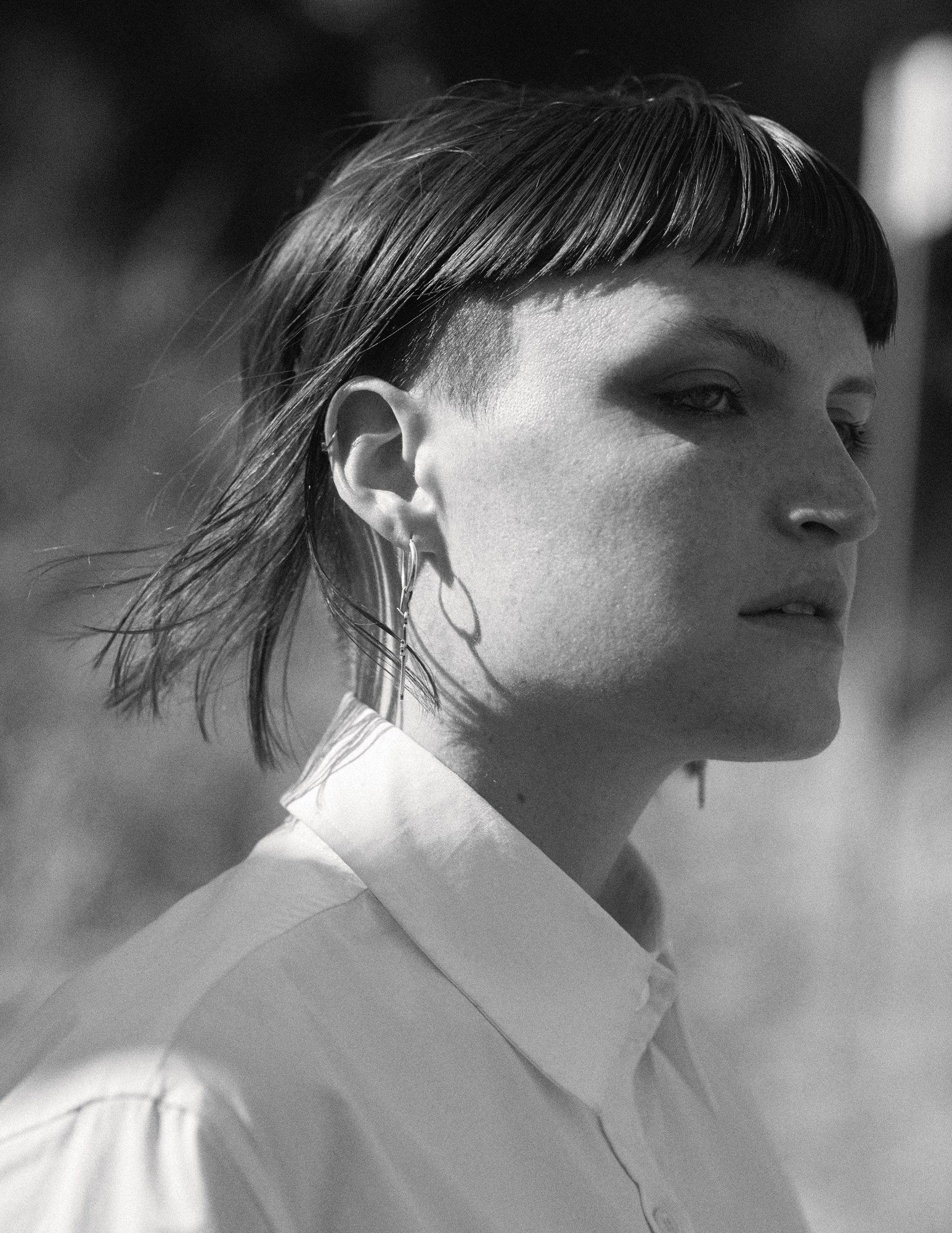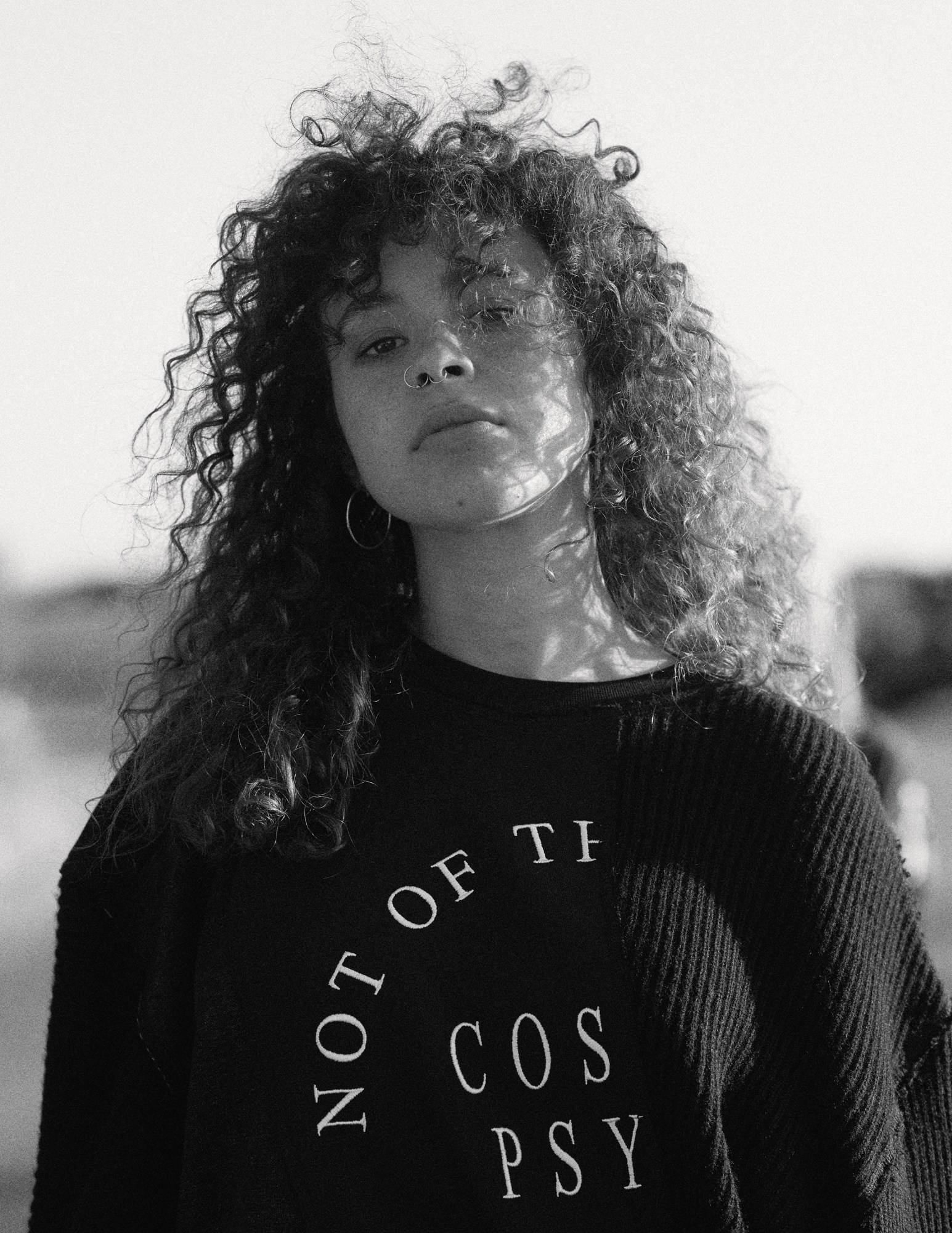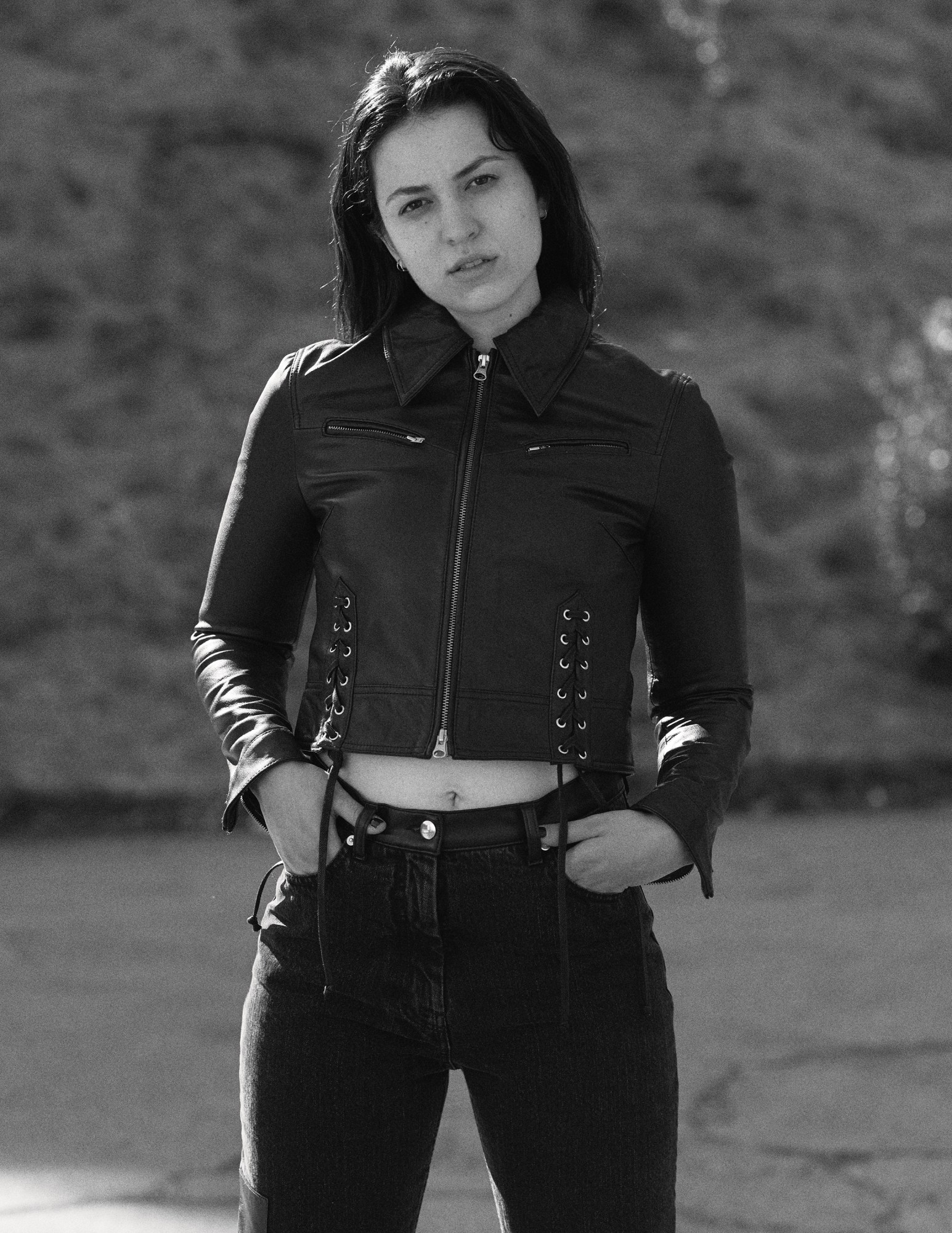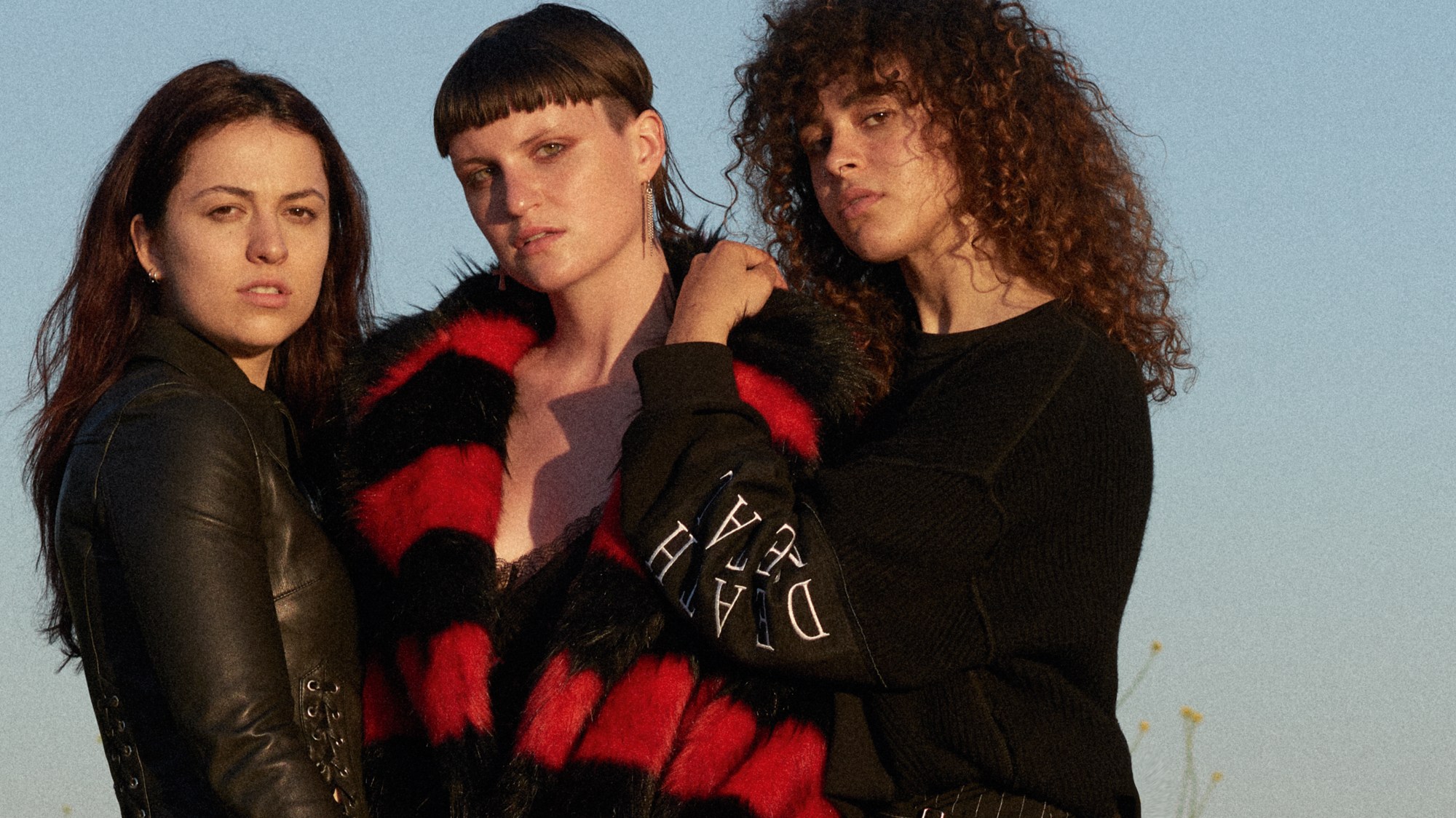This article originally appeared in The Sounding Off Issue, no. 350, Winter 2017.
It’s a hot summer’s day in east LA and MUNA just rolled up at the rented house being used as a base for their photoshoot in Echo Park. There’s an inadequate fan on rotation, birdsong dancing in through the open windows, and somebody just got back from an already-melting iced coffee run. Josette Maskin, Katie Gavin and Naomi McPherson (aged 23, 24, and 24 respectively) find a chair, a piece of sofa, and a rug to sprawl out on. Our new best mates, MUNA are the kind of girls who will take you on a driving tour of Silver Lake before treating you to dinner at their favourite Taiwanese restaurant. The sort that laugh a lot, pull stupid faces and fill you in on their private jokes. As they take it in turns to get their hair done, bodies dressed, and portraits taken, we sit and sip the cold brown stuff.
“This interview’s probably gonna be a disaster,” Naomi warns. “I’m so sorry. Every interview we do is like, ‘Talking to MUNA is difficult.’” It’s really not, although Naomi continues, likening their technique to a runaway train on fire, heading straight to hell. “That’s just our vibe. It’s a good time. And today we’ve had too much coffee.” It reminds her of the day that the band signed to RCA. On just three hours sleep they met their lawyer to go over the contract, before being given the strongest coffee they’d ever consumed at the label HQ. “It was insane. We were shaking and had meetings with the heads of each department and we were like: ‘We’re gonna change the fucking world!’ We were really, really feeling ourselves.”

If not completely changing the world, the trio – who met while studying at USC – are certainly making their mark on it. Following the release of their debut EP The Loudspeaker in 2016, which tackled sexual assault and difficult relationships, i-D declared MUNA to be ‘pop’s bright new loudspeakers’ and a fast-assembling global fanbase appeared to feel the same. Fast-forward to the arrival of their massive first album About U back in February of this year, and the self-proclaimed outsiders delivered a record full of vulnerability that they rightly hoped would embolden bravery in listeners of all backgrounds. Their audible love of Imogen Heap, Robyn, and 80s pop shines through in the form of vocoder, pounding bass and sensual synths; music to dance and cry to, that’ll lift you up, even in these tumultuous times.
While their anthem of inclusivity, I Know a Place, wasn’t a direct or intentional response to the horrific 2016 Pulse nightclub shooting in Orlando, it came along at exactly the right time to be a meaningful anthem for the LGBTQI+ community. Performing it live on Jimmy Kimmel two weeks after Trump’s inauguration, Katie changed the lyrics to echo the new political mood. “Even if our skin or our Gods look different,” she sang. “I believe all human life is significant/ I throw my arms open wide in resistance/ He’s not my leader even if he’s my President.” The simple act of protest was met with cheers and is guaranteed to give you tingles. “When we started as a band, we didn’t necessarily know what we would stand for,” Naomi explains, who, along with her bandmates, identifies as queer. “I think we were afraid of being a political band or a queer band, but we decided to be ourselves and talk about the things that are important to us. And then the world toppled in on itself a little bit and people started relating to us… maybe they were more open to it, or maybe they just needed it more.”

Katie, who composes the lyrics, doesn’t use gendered pronouns when she writes – after all, the songs are for you, the listener, whoever you are. “I love that the majority of our fans are gay men. I think that’s the best population of fan,” decides Josette. “Gay men and young women – they’re so devout,” Naomi continues. “And they won’t touch you inappropriately!” Josette adds, only half joking. East LA has resonance for MUNA, not just because they live nearby, but also because a small house on a hillside overlooking the Silver Lake reservoir was the birthplace of the world’s first gay rights organisation. The area was called Edendale back then (circa 1950), and the neighbourhood was home to British-born Harry Hay, a local legend who Naomi knows all about from her queer history class at college. “He was the founder of the Mattachine society – they had a newsletter and it was anonymous, you didn’t have to come out to receive it or anything. There was a huge gay scene out here in east LA.”
Though frequently away from home on what seems to be a never-ending tour, MUNA have not stopped writing music post the release of About U. “We’ve always been a jam band and it’s not natural for us to have a period where we’re not creating,” says Katie. “I love being at the start of something new. Even though we’re still technically in the world of About U, I really like this part; experiencing and theorising, you feel like anything could happen.” All self-produced by Naomi and Katie, they recently played some demos to a producer friend and after trying to figure out what was different about their new sound, he realised that, well, ‘It’s kind of happy.’ Have their state of minds changed significantly in the past year, then? “I guess we’re growing up,” Katie reasons.

It makes sense, given that just 18 months ago, the trio were working regular jobs while making music on the side. “Sometimes you wonder why you’re doing this. Am I just doing it to try to be a rockstar or some bullshit?” wonders Naomi. “It’s cool to see that our music can help people and make someone feel heard.” Their coming together was clearly for a reason; their band was destined to be a vital mouthpiece for our generation. “It’s all felt a lot like fate or something very cosmic,” says Josette. “It feels so much more powerful because MUNA is not us as individuals, MUNA is something greater than that.” She’s not wrong. MUNA are our leaders, even if they’re not our presidents!
Credits
Photography Evan Browning
Styling Julia Ehrlich
Hair Ramsall Martinez at Streeters using R+Co. Make-up Samuel Paul. Photography assistance Scott Turner.
